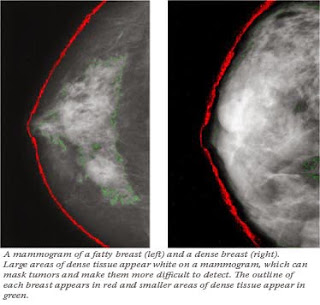Your breasts might be dense and you don’t even know it. At least that is what a report in the American Journal of Roentology says. More specifically, 40% of U.S. women unknowingly have dense breasts.
 |
| Women with dense breasts are at risk for breast cancer |
And there’s good reason why you shouldn’t be dim about your chest physiology—women with dense breasts are four to five times more likely to incur breast cancer, and 10 times more likely for a mammogram to miss one.
What are dense breasts?
When our girls are dense it doesn’t mean that they are stupid, it means that they have less fatty tissue than normal breasts. Think of it this way: less fat tissue may allow for more gland and support tissue. (We heard one physician call them “young” breasts.) Unfortunately, a self-breast exam will not help you identify whether your boobs are dense, only a mammogram can do it. So if your mother had dense breasts (and she knew about it), let your doctor know.
 |
| Dense is better? Think twice |
When firm breasts are a hazard
It’s normal for breast density to increase into your 30s and decrease as you enter your 40s, says Ian Grady, MD, FACS, founder of the North Valley Breast Clinic in Redding, Calif. But for about 20% of women, that density—caused by excess collagen in the breast—doesn’t go away. Researchers from the University of Washington St. Louis identified a protein—DDR2—on the surface of breast cancer tumors that, when it binds with that excess collagen encourages the cancer cells to spread.
 |
| When firm breasts are a hazard? |
“We know that, in cancer metastasis, a certain cellular pathway called EMT that turns regular breast cells from ducts to invasive cells,” says Greg Longmore, MD, senior author of the study and director of the Bright Institute at the university. “When DDR2 binds with that collagen, it keeps the pathway on like a green traffic light, allowing tumor cells to leave the tumor and spread—potentially reaching blood vessels or the lymphatic system.” And because there is so much extra collagen in dense breasts, that pathway stays open both longer and steadier.
DDR2 is present in 70% of invasive ductal carcinomas, the most common type of breast cancer, but not expressed by normal breast cells. Researchers are beginning to search for DDR2 on other types of tumors, but the hope for now is to develop an antibody to target the dangerous protein.
Rest assured, breast density is not an independent risk factor for breast cancer, but rather a biomarker of risk, says Grady. “If you have other risk factors, they’ll show up on the mammogram as breast density,” he says. “The key with breast cancer these days is early detection, and breast density can make it much harder.” That’s why doctors usually send patients with dense breasts for whole breast ultrasounds or, if there is a family history or past premalignant lesions, breast MRIs.
The Bottom Line
Increased breast density makes it harder for your doctor to detect early stage (read: treatable) breast cancers, which have a tendency to spread faster within dense breasts. Here are ways to be your own advocate at your next mammogram:
 |
Know your family history.
“Increased breast density is an inheritable trait,” says Grady. “If your mother has it, you’re more likely to have it too.” Women with dangerous gene mutations are also more likely to have dense breasts, he says.
 |
| Know your family history |
Read the radiology report.
There are four grades of breast density, says Grady, and breasts deemed heterogeneous or extremely dense should head to a comprehensive breast clinic or, at the very least, begin whole breast ultrasounds. How do you know what grade yours fall under? Ask your doctor, or request a copy of the original radiology report and find out for yourself.
 |
| 4 grades of breast density |
Interpret new screening protocols carefully. Recent controversial research found that women over 50 only need a mammogram every two years. But these new screening recommendations only apply to women at average risk. If you have dense breasts, you are at a higher risk; keep up with your screening yearly.
For more health info and promotions, please follow us on Facebook- Wellness Lab
 |
| Download Wellness Lab mobile apps now for more promotions |
If you like this article, you can share this to your friends and families , together we share the health information and the taste of a healthy life!


No comments:
Post a Comment